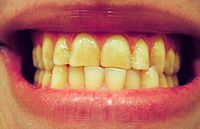
Photo from wikipedia
BACKGROUND During the mixed dentition period, masticatory performance may temporarily decline as deciduous teeth are replaced by permanent teeth. This may lead to an insufficient intake of chewy foods. OBJECTIVES… Click to show full abstract
BACKGROUND During the mixed dentition period, masticatory performance may temporarily decline as deciduous teeth are replaced by permanent teeth. This may lead to an insufficient intake of chewy foods. OBJECTIVES This study aimed to clarify the characteristics of factors that affect masticatory performance during the dentition exchange period. METHODS The participants were 229 students in grades 4-6 who were in the lateral dentition exchange period. Shearing performance (SP) was evaluated using gummy jelly, and mixing performance (MP) was evaluated using color-changing gum. The chewing rate, occlusal force and area, number of teeth, Hellman's tooth age, Rohrer index, grip strength, and walking speed were also evaluated. The χ2 test, Mann-Whitney test, Spearman's rank correlation coefficient, and a generalized linear model were used for statistical analysis. RESULTS SP/MP showed a significant positive correlation with occlusal force, occlusal contact area, and chewing rate for gummy jelly and gum but there was a difference in the strength of the correlation between boys and girls. Chewing rate for gummy jelly and gum showed a significant relationship with both SP and MP, suggesting that masticatory performance is higher with slower chewing. Maximum occlusal force was selected as a significant independent variable for SP, and Rohrer index was selected as a significant independent variable for MP. When the occlusal force was higher and the Rohrer index was lower, the masticatory performance tended to be higher. CONCLUSIONS Our results suggest that masticatory performance during the dentition exchange period is higher with slower chewing and a stronger occlusal force, which may be related to obesity.
Journal Title: Journal of oral rehabilitation
Year Published: 2022
Link to full text (if available)
Share on Social Media: Sign Up to like & get
recommendations!